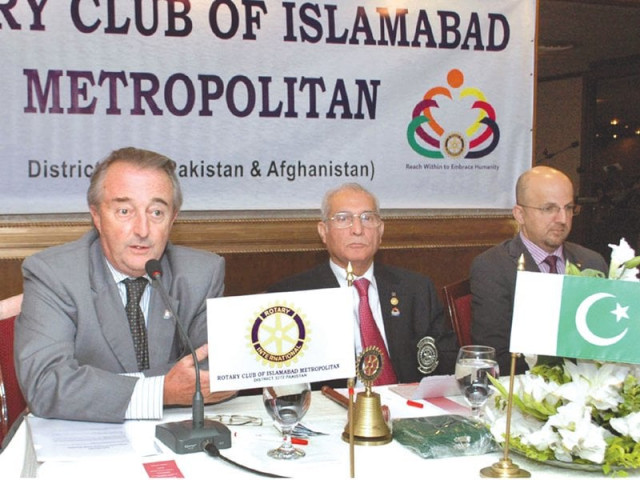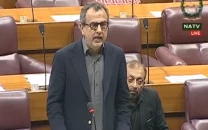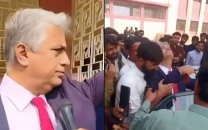Eager to help: Govt and private sector to opt for winning attitude for economic gains, says Argentinean ambassador
Hails first civilian transfer of power, bemoans indecision at government level that hurts trade.

Argentinean Ambassador Rodolfo J Martin-Saravia (L). PHOTO: APP
Pakistan’s government and private sector need to develop a winning attitude and be confident in their decision making in order to achieve economic gains.
This was said by Argentine Ambassador Rodolfo J Martin-Saravia during an exclusive interview with The Express Tribune.
“My perception, after so many years in Pakistan is that both the national and the provincial governments lack the decision making,” the Ambassador said. “They are very much open to dialogue and discussions but when the right moment to take the decision comes, then, most of the time, everything evaporates.”
Saravia, who is also dean of the Diplomatic Corps in Islamabad, said that hesitation in decision-making in Pakistan seems to seep beyond the governments and into the private sector as well, and it has been felt by representatives of most foreign countries and foreign companies.
He said this indecisiveness is not related to corruption but could be a crisis of confidence or a matter of over-thinking the solution.

This characteristic does not apply only to the present government, but has been the same during the previous years and previous governments, he said.
“It is like a Formula 1 racer who knows that if he speeds up and take a risk, he can win, but he is afraid to and then always finishes second or third,” Saravia said. “It is a pity because this is a great country with great people, but they need the last push to say, ‘let’s go for the win. I want to be on the top of the podium, not at second or third position’.”
Saravia, who has been serving as Argentina’s envoy here since 2004, said the “most important thing” he has witnessed in the country during the past decade has been the 2013 general elections, which saw a successful civilian transfer of power.
He said the new government faces three targets that have to be resolved on priority basis: energy crisis, the law and order situation, and the militancy. Time runs against the government. “At least one of these issues must be resolved in the short term or to show that they are moving in the right direction,” he said.
Global trade volume between the two countries is between USD100-200 million, the ambassador said, with the trade balance in Argentina’s favour.
He also said that Pakistan needs to reduce local industry’s dependence on imports and promote its exports to strengthen its economy and open trade opportunities with the world.
“If Pakistan diversifies its production it will automatically increase their exportations, so as to give more chances to increase trade,” he said.
Successful joint ventures between Argentina and Pakistan include BF Biosciences Limited --- Pakistan’s first biopharmaceutical production facility --- in Lahore which is a commercial partnership between Ferozsons Laboratories and Argentina’s Bago Group.
In the energy sector, Argentina is the world leader in the field of Compressed Natural Gas (CNG) and Argentinean companies have been actively participating in providing CNG equipment for government-run public transport projects, the envoy said.
Other opportunities to increase trade include tea imports from Argentina, the Ambassador said.
Argentina, as the first Latin American country to recognise Pakistan’s Independence, established diplomatic relations with it 63 years ago.
“Argentina and Pakistan have always been very close and both countries support each other on many international issues,” Saravia said.
These issues include climate change, peacekeeping forces and opposing the incorporation of new permanent members in the UN Security Council.
Ambassador Saravia said his most challenging objective in Pakistan is probably success in getting approval for building an extension of the Polyclinic Hospital on one-third of Argentina Park in Sector G-6.
He said that if this project is approved, the hospital will have 1,100 additional beds --- a substantial addition for the capital’s health sector.
According to him, Federal Finance Minister Senator Ishaq Dar and Federal Planning Minister Ahsan Iqbal have given the assurance that the plan will go ahead.
Argentina Park, which is located in front of the hospital, was donated to Argentina in 1973 by then-president Zulfikar Ali Bhutto. The donation acknowledged Argentina’s role in the UN to bring about a ceasefire between India and Pakistan in the 1971 war.
The Capital Development Authority (CDA) has already given its approval, Saravia said.
The final hurdle seems to be the release of around Rs52 million from the federal government to the CDA, which has to be sanctioned by the Planning Commission.
But Saravia said Prime Minister Nawaz Sharif can also pass an order to directly allocate the land to the hospital without any payment.
“I have been struggling for the last four years and I hope this government takes the final decision and we see the building in a few years,” he said.
Published in The Express Tribune, January 21st, 2014.



















COMMENTS
Comments are moderated and generally will be posted if they are on-topic and not abusive.
For more information, please see our Comments FAQ